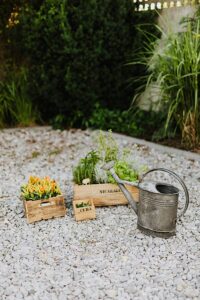A Step by Step Guide to Creating and Caring for a Memorial Garden
A memorial garden is a thoughtful way to remember a loved one, offering a peaceful space to reflect and cherish their memory. Whether it’s a small patch of flowers or an elaborate design, the process of creating and maintaining such a garden can be deeply meaningful. Here’s how to get started and make it uniquely your own.
Start with a Vision
- Reflect on the Purpose
– What will the garden represent? Think about whether it’s meant to honor a single person, multiple loved ones, or even a special cause. Knowing the intent helps shape the design.
– Make it personal: Consider elements that remind you of them—favorite plants, meaningful colors, or even symbolic features like a bench or sculpture. - Choose the Right Spot
– Find peace and privacy: Look for a quiet, secluded area where you can relax and reflect.
– Sunlight or shade? Make note of how much light the area gets so you can select the right plants.
– Easy access: Pick a location you can visit easily and that feels welcoming for others. - Plan Your Layout
– Think about the size and how you’d like to divide the space. Maybe you want a cozy seating area, a winding pathway, or sections for flowers and special items. - Set Your Budget
– List out all the materials and features you’ll need (plants, seating, decorations, and maintenance tools) and estimate the costs.
 Design the Space
Design the Space
- Incorporate Special Elements
– Plants and flowers:
– Choose plants with sentimental value, like a favorite flower or something symbolic, such as daisies for innocence or oak trees for strength.
– Include a mix of plants that bloom at different times to keep the garden lively throughout the year. - Key features:
– Pathways: Add stone, gravel, or mulch paths to guide visitors.
– Seating: Install a bench or chairs where people can sit and reflect.
– Personal items: Include things like engraved plaques, wind chimes, or other meaningful decorations. - Extras:
– Water features: A fountain or small pond can bring soothing sounds and attract birds or butterflies.
– Lighting: Add soft lights to create a serene atmosphere in the evening. - Map It Out
– Sketch or visually plan where everything will go. Group plants and features to create a cohesive look.
Bring Your Plan to Life
- Prepare the Area
– Clear the site: Remove any weeds, rocks, or debris to start with a clean slate.
– Mark the layout: Use markers or string to outline different sections of the garden.
– Improve the soil: Add compost or fertilizer to enrich the soil and help plants thrive. - Build the Foundations
– Paths and features: Lay down walkways and install any hard scape elements like benches or decorative stones.
– Decorative pieces: Position sculptures, plaques, or other meaningful items in their designated spots. - Plant with Care
– Stick to your plan, spacing plants appropriately to allow them to grow. After planting, spread mulch to keep the garden neat and help retain soil moisture. - Add the Final Details
– Set up water features, adjust lighting, and arrange finishing touches to bring the space together.
Keep It Beautiful
- Routine Maintenance
– Water regularly: Check each plant’s watering needs and adjust based on weather.
– Control weeds: A quick weeding session every couple of weeks keeps the garden tidy.
– Prune and tidy: Trim overgrown plants and remove spent flowers to encourage new growth. - Seasonal Care
– Spring: Refresh soil, plant new flowers, and repair any winter damage.
– Summer: Water more frequently and keep an eye out for pests or weeds.
– Fall: Rake leaves, trim plants, and prepare the garden for colder weather.
– Winter: Cover sensitive plants and clear snow from paths if needed. - Check Features
– Regularly inspect water features, lights, and decorations to make sure they’re in good condition.
Make It Meaningful
- Create Space for Rituals
– Add an area for quiet meditation, prayer, or a small gathering if you’d like to hold ceremonies in the garden. - Invite Visitors
– Share the space with family and friends, or provide a way for visitors to leave their thoughts, such as a guestbook or memory jar. - Let It Grow Over Time
– Don’t be afraid to update the garden over the years by adding new plants or features that feel meaningful as life evolves.
Practical Tips
- Take it slow: Building a memorial garden is a journey, not a race. Take your time and enjoy the process.
- Ask for help: Whether it’s friends, family, or local experts, don’t hesitate to get advice or assistance.
- Embrace the changes: Gardens grow and change naturally. Let the process remind you that life continues to bloom in its own way.
A memorial garden is more than a physical space…it’s a living tribute to someone you love. With care and intention, it will grow into a source of peace, comfort, and connection for years to come.
